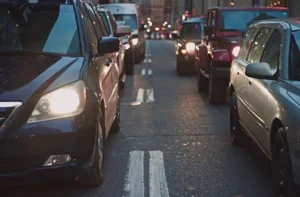You’re leaving a friendly get-together one night, and the familiar red and blue lights flash in your rearview mirror as you pull over to the side of the road. Your heart races, and your mind is flooded with worry about tonight and your future. You know a DUI California arrest can have serious consequences, but what exactly are you facing?
It’s natural to feel overwhelmed by uncertainty, and understanding California’s DUI laws and penalties can be complex. Contacting the Law Offices of Shawn M. George, APC, is your first step toward regaining control of your life.
What You Should Know About California’s DUI Laws
California law defines driving under the influence (DUI) as operating a vehicle with a blood alcohol concentration (BAC) of 0.08% or higher for most adult drivers. This limit decreases significantly to 0.04% for commercial drivers, while for drivers under 21, any detectable alcohol level is prohibited.
The essential elements prosecutors must prove for a DUI conviction include:
- You were driving a vehicle,
- You had a BAC at or above the legal alcohol limit in California, and
- Your ability to drive was impaired due to alcohol or drugs.
Proving these elements isn’t always straightforward, which is why having experienced representation matters.
California DUI Penalties: What’s at Stake?
California takes a stand against drunk driving by imposing strict penalties to discourage this risky behavior. The severity of the consequences for a DUI conviction varies significantly based on several factors, including the driver’s prior DUI offenses, the specific details of the arrest, and whether any injuries or fatalities resulted from the incident.
First-Time DUI Offense
- Fines from $390 to $1,000, plus additional penalty assessments;
- Anywhere from 48 hours to 6 months in county jail;
- Six-month suspension of your driver’s license, though you may be eligible for a restricted license;
- Mandatory DUI education classes lasting from three to nine months; and
- Informal probation of between three and five years.
Second DUI Offense (Within 10 Years)
- Fines ranging from $390 to $1,000, plus penalty assessments;
- Jail sentence from 96 hours up to 1 year;
- License suspension for up to two years;
- Alcohol education courses spanning 18 to 30 months; and
- Probation period up to five years.
Third DUI Offense (Within 10 Years)
- Fines of $390 to $1,000, plus penalty assessments;
- Jail sentence between 120 days and 1 year;
- Up to three-year license suspension;
- Extended DUI education program of up to 30 months; and
- Probation lasting up to five years.
California DUI penalties carry progressively tougher consequences, making it crucial to seek immediate legal help to protect your future.
Enhanced Penalties: When a DUI Becomes More Severe
Certain situations trigger harsher penalties under California law:
- High BAC. Penalties can increase substantially if your BAC measures 0.15% or higher.
- DUI causing injury or death. These factors make the charge a felony, with consequences of severe fines, restitution, prison time, and extended license revocations.
- Refusal to take chemical tests. Refusing to submit to breath or blood testing after arrest results in automatic license suspension under California’s implied consent law.
Recognizing these factors is crucial for understanding your position and determining your best defense strategies.
Long-Term Effects of a DUI Conviction
Beyond the immediate legal penalties, a DUI conviction carries additional negative consequences that can significantly affect your life, such as:
- Increased auto insurance premiums;
- Difficulty finding or keeping a job (especially one that requires driving or operating machinery);
- Social stigma;
- Damage to your reputation and relationships; and
- Restriction or revocation of your professional license for those in fields such as law, healthcare, and education.
Recognizing these broader implications underscores the necessity of promptly seeking skilled legal assistance to mitigate the long-term impact of a DUI California conviction on your life.
Don’t let a DUI define your future—call The Law Offices of Shawn M. George, APC, and take the first step toward protecting your rights today.
Potential Defenses Against DUI Charges
Facing a DUI charge does not automatically result in a conviction. Various legal defenses may apply to your case, including:
- Inaccurate BAC testing. Breathalyzers and blood tests must follow precise protocols. Equipment malfunction, improper calibration, or errors during testing procedures can be grounds to challenge the evidence.
- Illegal traffic stop. For evidence obtained after a traffic stop to be admissible in court, law enforcement must have had reasonable suspicion or probable cause to stop the vehicle in the first place.
- Rising blood alcohol defense. Alcohol absorption rates vary. It’s possible your BAC was below the legal limit while driving and rose above the threshold by the time of testing.
Our lawyers at The Law Offices of Shawn M. George, APC, will investigate your arrest details to determine the best way to defend you.
What to Expect From the DUI Court Process
Facing court after a DUI arrest can be daunting. Understanding the general process can help ease anxiety:
- Arraignment—the initial court appearance for reading of charges and entering pleas;
- Pretrial hearing—negotiations with prosecutors, possibly leading to plea bargains;
- Trial—presenting evidence with a judge or jury determining guilt; and
- Sentencing—hearing to determine penalties if convicted.
Knowing these stages equips you to collaborate better with your attorney and approach the process more confidently.
Benefits of Having an Experienced DUI California Attorney
Managing California DUI rules’ complexity alone is difficult and dangerous. With his extensive background as a former Deputy District Attorney, Attorney Shawn George understands exactly how prosecutors build their cases. He leverages this insider knowledge to craft a strategic defense tailored to your circumstances.
We maintain open communication and provide updates at every stage, ensuring you feel informed and confident. Our legal team will examine every aspect of your case, leaving no stone unturned. We’ll carefully analyze the evidence and identify weaknesses in the prosecution’s argument.
Your DUI Doesn’t Have the Last Word
A DUI charge can feel like a defining moment of crisis, but it doesn’t have to define you. A seasoned attorney can assist you in crafting a clear and achievable strategy to tackle this daunting hurdle, ensuring you grasp the possible outcomes.
Let Attorney Shawn George transform doubt into a decisive plan to safeguard your rights, reputation, and future. Take the first step toward reclaiming your peace of mind today and contact The Law Offices of Shawn M. George, APC.
Resources:
- Penalties for a Violation of Section 23152, CVC § 23536 (2007), link.
- Offenses Involving Alcohol and Drugs, CVC § 23153 (2017), link.
- Penalties for a Violation of Section 23152, CVC § 23546 (2005), link.
- Penalties for a Violation of Section 23152, CVC § 23540 (2005), link.
- Judicial Branch of California, What is a DUI/DWI Court?, link.
- California Department of Motor Vehicles, Driving Under the Influence (DUI), link.


